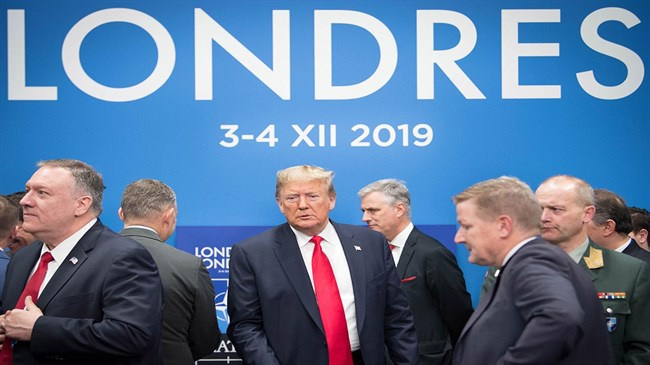What Donald Trump really thinks of European leaders

By Jacopo Barigazi, Florian Eder and Laurenz Gehrke
European leaders probably didn’t need a behind-the-scenes memoir to know that Donald Trump is a volatile leader who does not hold many of them in high regard.
Nonetheless, the details of what the US president thinks of Europe’s elite politicians – as recounted in former national security adviser John Bolton’s explosive book about his time in the White House – will still make for absorbing reading.
Trump has called Bolton a “liar” and a “disgruntled boring fool who only wanted to go to war.” And Secretary of State Mike Pompeo denounced the former administration official as a “traitor.” But aside from the White House machinations recounted in the book, here are some of Trump’s views on Europe and its leaders, as recounted by Bolton.
What Trump thinks of Emmanuel Macron
“Trump didn’t really like either [Canadian Prime Minister Justin] Trudeau or [French President Emmanuel] Macron, but he tolerated them, mockingly crossing swords with them in meetings, kidding on the straight,” Bolton writes of the 2018 G7 summit in Canada.
But Trump’s attitude toward the French president is not always consistent. “Trump mused that at some point [Macron] should meet with Iranian President [Hassan] Rouhani, flattering Macron as the best of the Europeans,” Bolton writes.
At the 2017 NATO summit, Trump accused Macron “of always leaking their conversations, which Macron denied, smiling broadly.” Trump later refused to answer Macron’s question on what the US was planning to do regarding trade with China.
Meanwhile, during negotiations about the Iran nuclear deal in 2019, Bolton says Trump told him, “Everything he [Macron] touches turns to shit.”
What Trump thinks of Angela Merkel and Germany
The president’s view of the German chancellor appears to reflect both respect for the country she leads and irritation with its foreign and security policy.
“[Trump] had great respect for Chancellor Merkel, noting that his father was German, and his mother Scottish,” Bolton writes in a chapter on the 2017 NATO summit in Brussels.
At the same meeting, Trump “kissed [Merkel] on both cheeks,” before saying, “I love Angela,” following a commitment by European NATO members to up defense spending.
But the US president has made no secret of his objection to the Nord Stream 2 gas pipeline project. “It’s very sad when Germany makes a massive oil-and-gas deal with Russia. We’re protecting all of these countries, and they make a pipeline deal,” Bolton quotes Trump as saying during a meeting with NATO Secretary General Jens Stoltenberg. “We’re going to have to do something, because we’re not going to put up with it. Germany is captured by Russia.”
What Trump thinks of Brexit, Theresa May and Boris Johnson
Describing Trump’s trip to the UK in 2018 to talk to then-PM Theresa May, Bolton writes that the president and himself would have liked to help the UK with the Brexit process, but found it hard.
“Implementing the [Brexit] vote had been disastrously mishandled, thereby threatening political stability in Britain itself,” he writes. “We should have been doing far more to help the Brexiteers, and I certainly tried. Unfortunately, apart from Trump and myself, almost no one in the administration seemed to care. What a potential tragedy.”
During the same trip, Trump bragged to May about his state visit to China the previous year.
“He said he was greeted by a hundred thousand soldiers and said, ‘There’s never been anything like it before in the history of the world.’” Bolton writes.
And the former White House official claims that Boris Johnson is Trump’s joint-favorite world leader, alongside Prime Minister of Japan Abe Shinzo.
What Trump thinks of Jean-Claude Juncker and the EU
On Jean-Claude Juncker, president of the European Commission until last year, Trump said he thought he was “a vicious man who hated the United States desperately.”
“The EU is worse than China, only smaller,” Trump said, according to Bolton, even arguing to Merkel that the bloc had been set up to “take advantage of the US.”
Source: Politico

